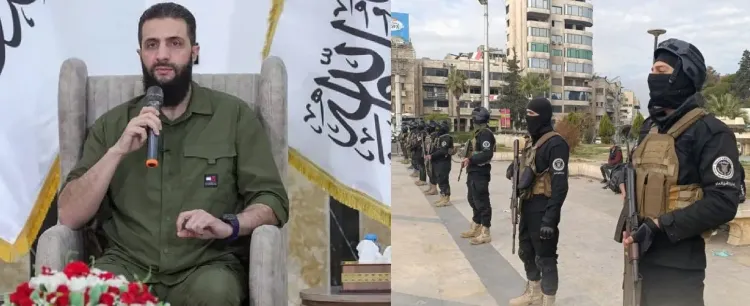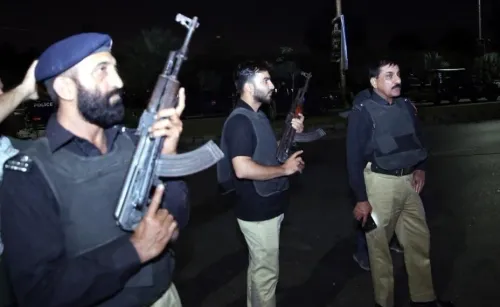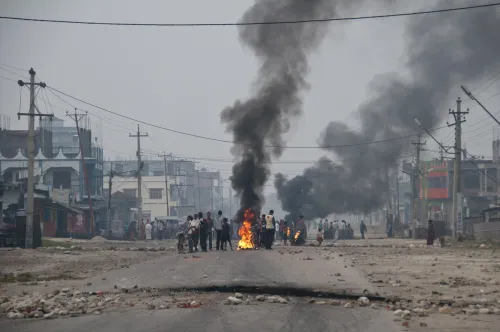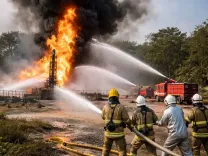Islamist Leader Julani Takes Charge in Syria After Al-Qaida and Zawahiri Ties

Damascus, Dec 8 (NationPress) As the Islamist rebel faction Hayat Tahrir al-Sham (HTS) proclaimed on Sunday the collapse of President Bashar al-Assad's regime in Syria and the start of a new era after seizing Damascus, focus shifts to the forthcoming actions of its leader Abu Mohammad al-Julani, who once allied with Abu Bakr al-Baghdadi, the founder of the Islamic State of Iraq and Syria (ISIS).
Previously known as the Nusra Front and linked to Al-Qaida, HTS has spearheaded rebel factions in a significant offensive across northern Syria since November 27, capturing critical cities such as Aleppo and Hama before ultimately breaching Damascus.
While various conflicting reports regarding the location of President Bashar Al-Assad continue to surface, global attention is riveted on the turbulence instigated by HTS, which the United States has classified as a terrorist organization. Abu Mohammad al-Julani, designated a 'Specially Designated Global Terrorist', has a $10 million bounty on his head.
Born as Ahmed Hussein Al-Shara, Julani is also recognized as Mohammad al-Jawlani and Abu Muhammad al-Golani. He has previously served with Al-Qaida in Iraq and endured five years in a U.S. prison.
Julani pledged allegiance to Al-Qaida and its leader Ayman al-Zawahiri as early as 2012 when Al-Nusrah Front committed to overthrowing President Bashar al-Assad’s regime.
It was at the behest of Baghdadi that Julani was tasked with establishing a foothold for Al-Qaida in Syria, building a local presence and engaging in combat. Al-Qaida in Iraq provided the Nusra Front with manpower, funds, arms, and strategic advice.
In May 2013, Julani was recognized as a 'Specially Designated Global Terrorist' by the U.S. State Department
The FBI sought intelligence on the leadership of the Al Nusra Front, and the U.S. Department of State’s Rewards for Justice program offered a reward of up to $10 million for information leading to Julani's identification or whereabouts.
On July 24, 2013, the UN Security Council ISIL (Da'esh) and Al-Qaida Sanctions Committee listed Julani as a sanctioned terrorist, subjecting him to an international asset freeze, travel ban, and arms embargo.
In July 2016, Julani lauded Al-Qaida and Zawahiri in an online presentation while revealing that the ANF, Al-Qaida's affiliate in Syria, was rebranding as Jabhat Fath Al Sham (Conquest of the Levant Front).
The following year saw a merger with several other radical opposition factions, culminating in the formation of Hayat Tahrir al-Sham (HTS) under Julani's command.
Local reports indicate that the militant organization HTS and Julani have resurfaced on the regional stage after a five-year withdrawal, a period during which the group underwent numerous internal changes regarding relations with other factions in Idlib and faced significant regional and international shifts, including the Covid-19 pandemic, the Ukrainian war, and the Al-Aqsa flood.
According to Lebanon's Al-Manar, HTS has successfully navigated numerous challenges in recent years, following its split from ISIS, pledging allegiance to the global Al-Qaeda organization, then later severing ties, and evolving into Jabhat Fateh al-Sham and subsequently into Hayat Tahrir al-Sham, establishing itself as a local military, administrative, and political authority.
The report further noted that HTS managed to maintain its dominance and control in the region, aided by the establishment of the so-called 'Salvation Government' in Idlib, the Covid-19 pandemic, and the Russia-Ukraine conflict which diverted global focus from Syria for an extended period.
Since Jabhat al-Nusra cut ties with Al-Qaeda in 2017, Abu Muhammad al-Julani has aimed to forge a new strategy based on 'jihadism in methodology and nationalism in geography', leveraging insights from Iraq and the realities of Syria.
Meanwhile, numerous analysts assert that those rejoicing over the fall of the longstanding Bashar al-Assad regime are, in a sense, supporting terrorist elements from ISIS and Al-Qaeda.
Russia, which has placed its military bases in Syria on 'high alert', expressed grave concern over the 'dramatic events'.
A statement issued by the Russian Foreign Ministry reported, 'Due to negotiations between B. Assad and several parties involved in the armed conflict in the SAR, he decided to vacate his presidential position and departed the country, instructing a peaceful power transfer. Russia was not involved in these negotiations. We strongly urge all involved parties to renounce violence and to resolve governance matters through political means.'










